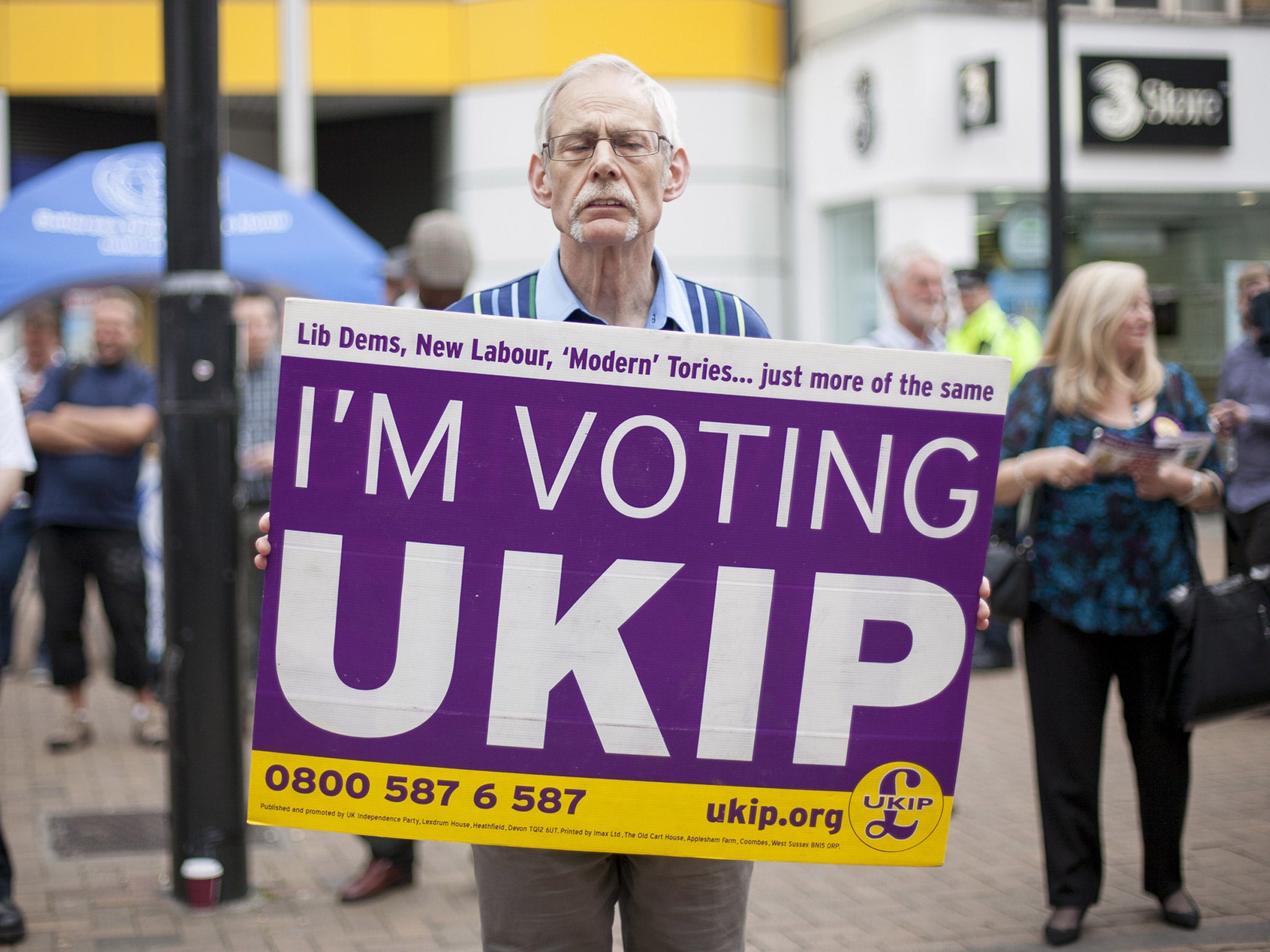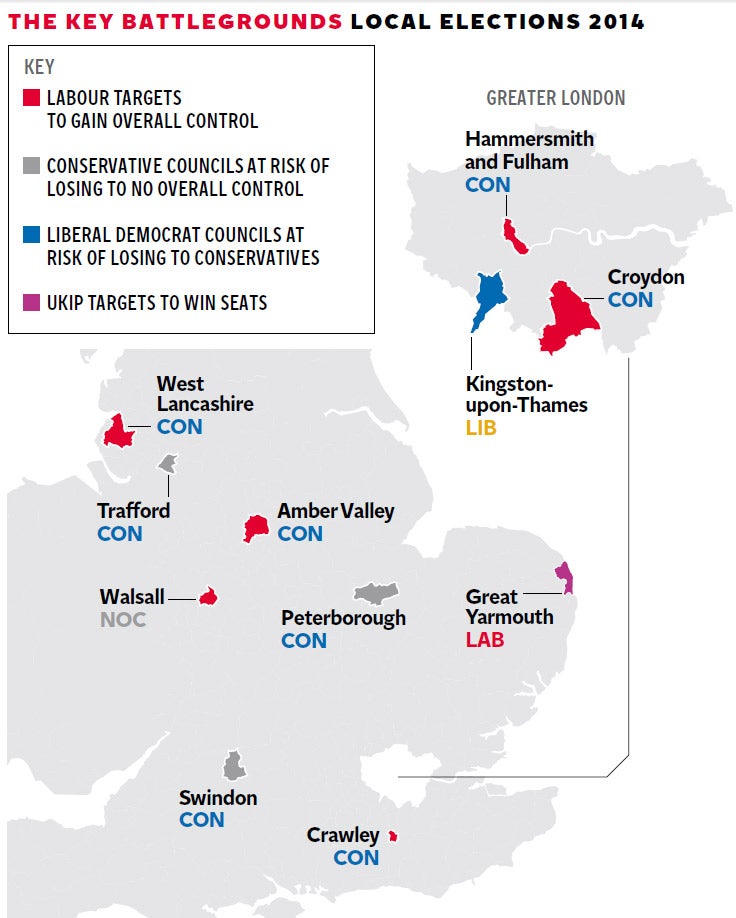EU and local elections 2014: Last-minute polling shows surge in Ukip support
Survey results come as Osborne says 'pessimistic' Labour and Ukip 'want to pull up the drawbridge and shut Britain off from the world'

A surge in support for Ukip, fuelled by anger over immigration levels, has hit Tory and Labour efforts to win over the crucial voters who will decide next year’s general election result, according to a survey.
The ComRes poll, which underlines Ukip’s destabilising impact on Westminster’s established parties, comes as political leaders began a final round of campaigning ahead of Thursday's European and local elections.
Ukip has set itself the target of winning the most votes in the Euro elections, while Labour will be hoping to pick up hundreds of council seats across England.
The Conservatives and Liberal Democrats are both braced for losses in what threatens to be a gloomy set of contests for the Coalition partners. The Cabinet yesterday agreed the final details of a Queen’s Speech programme to be set out on 4 June in an effort to demonstrate the Coalition has not run out of steam.
The ComRes survey, in the 40 most marginal Labour-Tory constituencies in Britain, found a small swing to Labour in the seats likely to define the general election’s outcome.
It put Labour on 35 per cent (down two points since the last election), two ahead of the Conservatives on 33 per cent (down four).
Ukip is riding high on 17 per cent, more than four times its election performance of just three per cent in those constituencies.
The poll found that 44 per cent of voters named controlling immigration as among their top priorities – and that Ukip was judged the party most trusted on the issue.
The current strong showing for Nigel Farage’s party suggests there is still everything to play for in the most marginal seats.
Both Labour and the Tories are pouring vast resources into the constituencies on the grounds that shifting affiliations among a few thousand voters could make all the difference in a close-fought election. The success of attempts to woo back Ukip-leaning voters over the next year could be crucial to success or failure.
The findings reinforce suggestions that the local elections are among the most unpredictable in recent political history.
Labour will be looking to make steady gains in London and metropolitan boroughs, and to show it can reach out to voters in Southern councils such as Crawley and Swindon.
It needs to perform strongly as the last time the councils were contested was at the nadir of the party’s unpopularity under Gordon Brown.

The Tories, who have the most councillors in Britain, will be attempting to fend off Labour advances in Northern and Midlands town halls including Trafford and Amber Valley. They are also aiming to capture Kingston-upon-Thames in South-West London from the Liberal Democrats.
The Lib Dems are engaged in damage limitation, hoping to keep net losses relatively small and to show they can hang on in councils where they are established.
Ukip, meanwhile, are expected to make around 100 gains, although the party will be keeping the champagne on ice for the European election results, which will be declared on Sunday.
Speaking to the CBI tomorrow, the Chancellor George Osborne will accuse Labour and Ukip of having a “deeply pessimistic anti-business agenda”. He will say: “Political parties on the left and the populist right have this in common: they want to pull up the drawbridge and shut Britain off from the world.”
ComRes interviewed a representative sample of 1,030 adults living in the 40 most marginal constituencies where the Conservatives and Labour shared first and second place the last election. Data were also weighted by past vote recall.
Good night/bad night: What do the parties want to achieve?
Labour
Good night: Winning the most votes and gaining more than 300 seats. Signs of progress in parts of the country – such as the south-east – currently immune to the party’s charms.
Bad night: Fewer than 200 gains would suggest Labour is failing to achieve the traction it needs to propel Ed Miliband into Downing Street next May.
Tories
Good night: Maintaining their losses below 200 seats would be welcome news, suggesting Ukip is having less impact than the party feared. Winning Kingston-upon-Thames.
Bad night: Losing more than 300 of the 1,600 seats they are defending would show their support remains anaemic. The loss of Trafford would leave them without any Northern metropolitan authority.
Ukip
Good night: Making around 100 gains would show they are reaching into urban areas not noted for Ukip sympathies. Gaining a foothold on London authorities
Bad night: Precious few gains would underline accusations that the party’s appeal is patchy and largely limited to the shires and suburbs.
Lberal Democrats
Good night: 200 losses would come as a relief given the party’s parlous standing in the polls. Defending seats in areas such as Kingston, Sutton and Westmoreland where they are dug in.
Bad night: The loss of another 400 seats would be a fresh bodyblow to morale, especially if they are ousted from power in Kingston.
Join our commenting forum
Join thought-provoking conversations, follow other Independent readers and see their replies
Comments